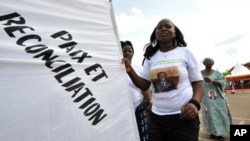Ivory Coast President Alassane Ouattara is taking a message of reconciliation to towns still affected by last year’s violent transfer of power. On Monday he visited Duekoue, where hundreds of people were killed allegedly by his supporters during the armed struggle that ensued when former president Laurent Gbagbo refused to give up power after losing an election. President Ouattara spoke of unity and promised development.
President Alassane Ouattara arrived to a warm welcome in Duekoue and the rest of the western region, bearing new Toyota SUVs, $500,000 for the districts and promises to end all power outages and water cuts by the end of the year.
His plan, coupled with a message of reconciliation, may be winning over Ivorians who opposed his election.
In the isolated town of Toulepleu, where the majority of the population is from the Guere ethnic group, which overwhelmingly supported former president Laurent Gbagbo, Mr. Ouattara’s promises were received with applause.
"I can tell you, yes, I can tell you that for the road from Toulepleu, Blolequin, we're finished the research, and the road will be paved before the end of my term."
Fifty-year-old farmer Anderson Kele in Toulepleu sits under a tree sipping tea and talking with his friend who he lived with in Liberia for one year as a refugee. He says he was apprehensive when the president’s security forces arrived in Toulepleu a couple of days before the president’s arrival.
He says when he saw the soldiers arrive, it resembled the arrival of the rebels last year. He says they were afraid and had fear in their hearts, but in the end no one was threatened. He believes now that you have to put your confidence in the winner, and he thinks the population in Toulepleu supports Mr. Ouattara now.
In each town the president visits, development promises are coupled with words of reconciliation. His new mantra is that he is the president of all Ivorians and he is asking for all ethnic and religious groups to work with him to build a stable and united future.
"In order for there to be reconciliation, there needs to be forgiveness, but there also needs to be repentance. I ask all of those among you, all of we Ivoirians, in whatever manner it happened, that those of us who have carried out misdeeds, we admit them to the justice system," he said.
But not everyone is so quick to accept the president’s message.
During the president’s visit in Duekoue Monday, site of a notorious massacre in the Carrefour neighborhood by what human rights groups says were pro Ouattara fighters, some say they are still unsettled.
Constance Bohe, a leader of one group of returnees, says people here still do not have the truth, and there hasn’t been any justice for the perpetrators.
He says it’s not normal for the neighborhood to undergo a massacre and then to not have the truth, to move on without knowing what happened and who did what. He says the neighborhood has not seen any concrete action from the justice system other than visits by some government and International Criminal Court investigators.
The government’s commission of inquiry and the ICC are still investigating post-election crimes in Ivory Coast. The United Nations estimates more than 3,000 people died in the 2011 post-election ethnic violence. So far, no one who supported President Ouattara has been charged.




